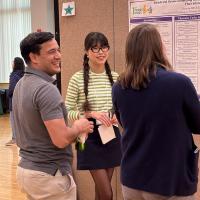Student research takes center stage at Graduate & Honors Research Symposium
 “Graduate students are often at the forefront of what is new and invigorating in their research fields,” said the Director of the Arts & Sciences Graduate Center Sarah Glosson, ’98, M.A. ’09, Ph.D. ’15. At the 2024 Graduate & Honors Research Symposium, that invigorating and interdisciplinary graduate research was on full display.
“Graduate students are often at the forefront of what is new and invigorating in their research fields,” said the Director of the Arts & Sciences Graduate Center Sarah Glosson, ’98, M.A. ’09, Ph.D. ’15. At the 2024 Graduate & Honors Research Symposium, that invigorating and interdisciplinary graduate research was on full display.
Graduate students kicked off the symposium on Wednesday, March 20, when seven students competed in the Three Minute Thesis event. The competition challenges presenters to distill their complex original research into a three-minute presentation, delivered without notes and supported by only a single PowerPoint slide. A panel of judges decided the overall winners, while the audience voted on the “people’s choice” award.
Caroline Donovan, an M.A. student in the Department of Anthropology, took home both the overall and public opinion awards with her presentation “‘Archeology Isn’t Worth What I’ve Been Through’: Documenting Patterns of Inequity and Harassment in Pacific Island Archeology.”
The Three Minute Thesis competition challenges student presenters but also creates a sense of community as students gather to prepare their talks in the weeks leading up to the contest. Donovan said, “I love the 3MT competition at William & Mary because the process is collaborative. By discussing my research with other graduate students outside of my department in preparation for the event, I learned how to explain my research to a general audience, and I learned to identify my main research components.”
In the following two days of the symposium, over one hundred and fifty graduate and undergraduate students presented their research in conference panels and poster sessions.
The annual symposium draws students from almost every department at W&M, making it a truly interdisciplinary symposium. For many presenters, that crossing of disciplinary boundaries is both difficult and rewarding.
Amanda Mitchell, an M.A. student in the chemistry department and the winner of the symposium’s W&M Interdisciplinary Award for Excellence in Research, appreciated the chance to present her research at an interdisciplinary conference. She had previously shared her work at chemistry-specific conferences but never an interdisciplinary one.
“To be able to really look at the bigger picture and explain to people the overall importance and takeaways of the work that you’re doing is a really important skill to have,” Mitchell said.
Students had to consider the conference’s interdisciplinary nature when planning their presentations.
“I had a lot of fun tailoring my research to a universal audience,” said Nic DeStefano, a physics Ph.D. student who won the Graduate Studies Advisory Board Award for Excellence in Scholarship in the Natural and Computational Sciences. “I made heavy use of analogies to relate to my research and even included a demonstration explaining an effect within my project.”
The event not only crosses disciplinary boundaries but also degree levels. The symposium, which held its first meeting in 2002, was formerly restricted to graduate students. In 2023 and 2024, however, undergraduate student research was also accepted.
“By presenting side-by-side with graduate students, our honors seniors also get an exciting sneak peek at where their research journey could take them next,” said Kate Patterson, the Undergraduate Research Program Administrator at the Charles Center.
History major Kendall McKinley ’24 presented her honors research on American foreign policy during one of the undergraduate sessions. McKinley noted that the conference gave her the opportunity to gain greater confidence in public speaking. “I intend to use these skills not only in my oral defense of my thesis but also in grad school and further research symposia I attend in the future,” McKinley said. “The more practice I get spreading my research, the better.”
While the symposium revolves around the presentations of student research, a tremendous amount of work to produce the symposium takes place behind the scenes.
Justin Estreicher, a Ph.D. candidate in the history department, caught a glimpse of that work by serving as a Volunteer Coordinator on the 2024 GHRS Organizing Committee. He presented his own research at the symposium in a previous year, but serving on the organizing committee revealed a different perspective of what it takes to produce a conference. “It’s certainly given me an appreciation for how much legwork goes into all of it,” Estreicher said.
Much of that legwork is coordinated by Glosson. “The Symposium allows graduate students a chance to get experience with giving conference presentations and to share their work with their colleagues in a setting that is friendly and lower stakes but can also be generative,” said Glosson. The symposium has become an important part of the graduate studies community for both peer review and professional development.
The original, innovative research that takes place at W&M is what attracts many graduate students to the university. The Graduate & Honors Research Symposium creates an opportunity to share and celebrate that student-generated research.














